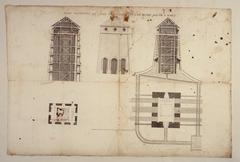Pavillon de Polignac: Visiting Hours, Tickets, and Guide to Saint-Germain-en-Laye Historical Sites
Date: 14/06/2025
Introduction: Discovering the Pavillon de Polignac
Situated in the heart of Saint-Germain-en-Laye, the Pavillon de Polignac is a remarkable testament to French aristocratic heritage, architectural sophistication, and the vibrant history of the Île-de-France region. While primarily a private residence and not generally open to the public, its neoclassical façade and storied past attract architecture enthusiasts and history lovers alike. This comprehensive guide provides an in-depth look at the pavilion’s historical significance, architectural features, practical visitor information—including visiting hours and ticketing details—as well as recommendations for exploring nearby cultural landmarks like the Château de Saint-Germain-en-Laye and the National Archaeology Museum. For the most up-to-date information, consult official resources such as the Saint-Germain-en-Laye tourism website and curated travel guides.
Historical and Architectural Overview
Origins and Legacy
The Pavillon de Polignac traces its roots to the transformative periods of the late 18th and early 19th centuries, reflecting the transition from Baroque exuberance to neoclassical restraint. Closely linked to the influential Polignac family—particularly Yolande de Polastron, Duchess of Polignac, a confidante of Marie-Antoinette—the pavilion stands as a symbol of aristocratic refinement. It has been partially listed as a Monument Historique since 1974, ensuring the preservation of its architectural integrity (Monumentum; POP Culture).
Architectural Highlights
- Site and Setting: Located at 15 rue Alexandre-Dumas and 2 rue Giraud-Theulon, the pavilion harmonizes with the urban landscape of central Saint-Germain-en-Laye, a town with royal connections since the 12th century.
- Structural Composition: Built primarily of masonry with smooth render, the two-story structure reflects the style of urban mansions (hôtels particuliers) of the period.
- Façade and Decorative Elements: The garden façade is distinguished by its classical Doric columns and pediment, emblematic of neoclassical design. Decorative details are elegant yet restrained, favoring proportion and clarity over ornate excess.
- Roof Structure: The building features a long-pitched (toit à longs pans) roof, common in 18th and 19th-century French domestic architecture, allowing for attic space and contributing to its distinctive silhouette.
- Interior Layout: Although not open to the public, the interior likely follows the period convention of reception rooms on the ground floor and private quarters above, with large windows overlooking the garden.
For historical context and additional images, see Wikimedia Commons.
Visitor Information
Can You Visit the Pavillon de Polignac?
- Interior Access: The pavilion is a private residence and not open for public interior visits.
- Exterior Viewing: Visitors can admire the exterior architecture from public roads, notably rue Alexandre-Dumas and rue Giraud-Theulon.
- Visiting Hours: There are no official visiting hours for the pavilion’s exterior; it is viewable from the street at any time during daylight.
- Tickets: No admission fee is required to view the exterior.
- Guided Tours: Some local walking tours feature the pavilion as part of broader itineraries exploring Saint-Germain-en-Laye’s royal and architectural heritage. Check with the Saint-Germain-en-Laye Tourist Office for current offerings.
- Accessibility: The surrounding streets are generally accessible by foot and public transport. Limited street parking is available; use public transit when possible.
- Special Events: Access to the garden or interior is occasionally granted during cultural or heritage events. Consult official listings for updates.
Exploring Saint-Germain-en-Laye: Nearby Historical Sites
Saint-Germain-en-Laye is a destination rich in history and culture, offering visitors much more than the Pavillon de Polignac:
- Château de Saint-Germain-en-Laye: A former royal residence, now home to the National Archaeology Museum (France-Voyage).
- Grande Terrasse: A panoramic promenade designed by André Le Nôtre, offering sweeping views over the Seine Valley.
- Grande Écurie du Roi (Royal Stables): Historic stables reflecting the town’s royal past.
- Musée Maurice Denis: Dedicated to the Nabi painter, located in a former private mansion.
- Maison Debussy: Birthplace of the composer Claude Debussy (SoloSophie).
- Forêt de Saint-Germain-en-Laye: A vast national forest ideal for walks and outdoor activities.
For a map and more attractions, see Mapcarta.
Travel and Visitor Tips
- Getting There: The RER A train from central Paris reaches Saint-Germain-en-Laye in about 25 minutes (La Souris Globe-Trotteuse).
- Best Time to Visit: Spring and early autumn offer pleasant weather and fewer crowds.
- Comfort: Wear comfortable shoes, as many historic sites are best explored by walking.
- Photography: Sunset provides particularly beautiful light for exterior photos.
- Dining: Consider a meal at the Pavillon Henri IV restaurant for a blend of history and gourmet cuisine (French Moments).
Frequently Asked Questions (FAQ)
Q: Is the Pavillon de Polignac open to visitors?
A: No, it is a private residence. The exterior can be appreciated from the street, but interior access is not available.
Q: Are there guided tours that include the pavilion?
A: Some walking tours discuss the Pavillon de Polignac as part of broader explorations of the town’s history.
Q: What are the nearest attractions?
A: The Château de Saint-Germain-en-Laye, National Archaeology Museum, Grande Terrasse, and Maison Debussy.
Q: Is the site accessible for wheelchairs?
A: The streets are generally accessible, though some areas may have uneven paving. Major attractions like the château offer wheelchair access.
Q: How do I get to Saint-Germain-en-Laye?
A: The RER A train from Paris is the fastest and most convenient method.
Q: Are there tickets required?
A: No tickets are necessary for exterior viewing. Guided tours may have fees.
Visual Gallery
Photos of the Pavillon de Polignac’s façade, nearby Château de Saint-Germain-en-Laye, and panoramic views are available on Wikimedia Commons.
Summary and How to Stay Updated
The Pavillon de Polignac, with its aristocratic origins and architectural refinement, is an essential stop on any exploration of Saint-Germain-en-Laye’s historical landscape. While the interior is not generally accessible, the pavilion’s neoclassical exterior and its setting in a town steeped in royal history offer plenty for visitors to enjoy. Complement your visit by exploring nearby attractions, and check official tourism platforms or the Audiala app for the latest information on opening hours, events, and guided tours.
For more information, visit the Saint-Germain-en-Laye Tourist Office, browse cultural event listings, and consider using the Audiala app for curated travel experiences.
Sources and Official Links
- Monumentum
- POP Culture
- France-Voyage
- Wikimedia Commons
- Saint-Germain-en-Laye Official Site
- Culturezvous
- French Moments
- Mapcarta
- Visit Paris Region
- SoloSophie
- La Souris Globe-Trotteuse




